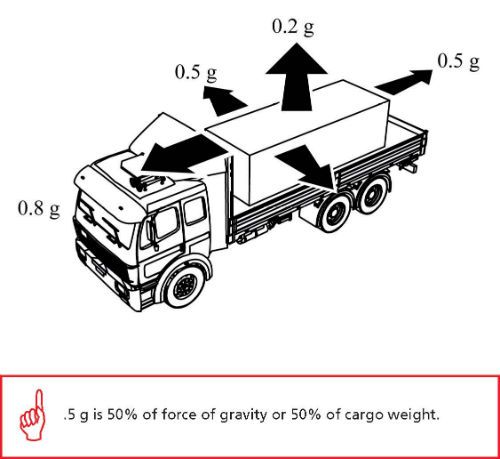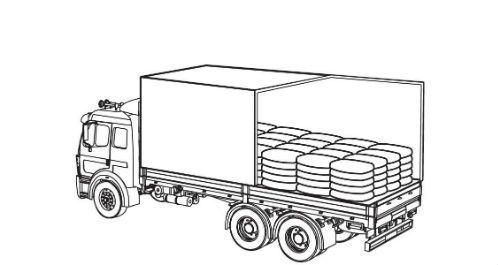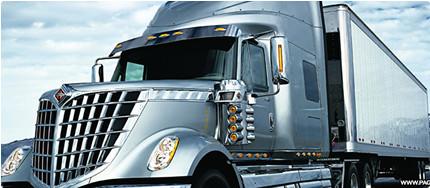Review Questions - Click On The Picture To Begin...

- 5,000 lbs
- 10,000 lbs
- 26,001 lbs
- 4,500 lbs
Quote From The CDL Manual:
Vehicle Type:
Vehicle Type - for commercial vehicles (trucks, truck tractors, semitrailers, full trailers and tractor-pole trailers) with a gross vehicle weight rating of more than 4,500 kgs. / 10,000 lbs.
- 100% of the cargo weight
- 20% of the cargo weight
- 50% of the cargo weight
- 80% of the cargo weight
Quote From The CDL Manual:
- The forward force (80% of the cargo weight) represents braking while driving straight ahead.
- The rearward force (50% of the cargo weight) represents vehicle acceleration or braking in reverse.
- The side-to-side or lateral force (50% of the cargo weight) represents traveling on a curve, ramp or changing lanes.
- The vertical force (20% of the cargo weight)) represents cargo vibration during transport. This requirement is satisfied when the cargo is "Fully Contained"
- Cargo is placed against a vehicle structure of adequate strength or other cargo so that it cannot shift or tip.
- A vehicle especially built and fitted with locking devices for the transport of intermodal containers.
- A combination of securing devices which form an assembly that attaches cargo to, or restrains cargo on, a vehicle or trailer, and is attached to anchor point(s).
- A structure, device, or another substantial article placed against or around an article to prevent horizontal movement of the article.
Quote From The CDL Manual:
"Fully contained" means that the cargo is placed against a vehicle structure of adequate strength or other cargo so that it cannot shift or tip. Cargo that fills a sided vehicle of adequate strength is considered fully contained.
- Working Load Limit
- Void Filler
- Edge Protector
- Tiedown
Quote From The CDL Manual:
Tiedown:
A combination of securing devices which form an assembly that attaches cargo to, or restrains cargo on, a vehicle or trailer, and is attached to anchor point(s).
- A combination of securing devices which form an assembly that attaches cargo to, or restrains cargo on, a vehicle or trailer, and is attached to anchor point(s).
- The depression formed between two cylindrical articles when they are laid with their eyes horizontal and parallel against each other.
- The summation of the working load limits or restraining capacity of all devices used to secure an article on a vehicle.
- The maximum load that may be applied to a component of a cargo securement system during normal service, usually assigned by the manufacturer of the component.
Quote From The CDL Manual:
Working Load Limit (WLL):
The maximum load that may be applied to a component of a cargo securement system during normal service, usually assigned by the manufacturer of the component.
- 100% of cargo weight.
- 50% of cargo weight.
- 5,000 lbs.
- 5% of cargo weight.
Quote From The CDL Manual:
g:
The acceleration due to gravity, 9.823 m/sec2 (32.2 ft/sec2). For cargo securement purposes it is expressed as a percentage of cargo weight, i.e. .5g is 50% of force of gravity or 50% of cargo weight.
- 21,000 lbs
- 10,000 lbs
- 16,800 lbs
- 10,500 lbs
Quote From The CDL Manual:
- The forward force (80% of the cargo weight) represents braking while driving straight ahead.
- The rearward force (50% of the cargo weight) represents vehicle acceleration or braking in reverse.
- The side-to-side or lateral force (50% of the cargo weight) represents traveling on a curve, ramp or changing lanes.
- The vertical force (20% of the cargo weight)) represents cargo vibration during transport. This requirement is satisfied when the cargo is "Fully Contained"





 Cargo Securement Terms That Truck Drivers Should Know:
Cargo Securement Terms That Truck Drivers Should Know:



 TT On Facebook
TT On Facebook